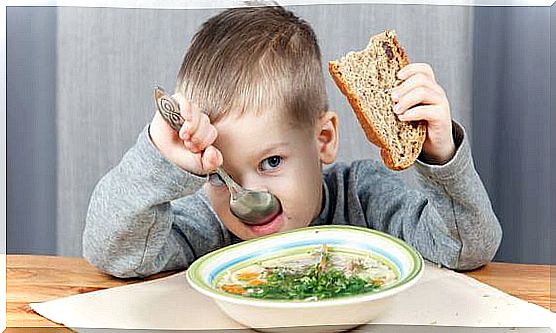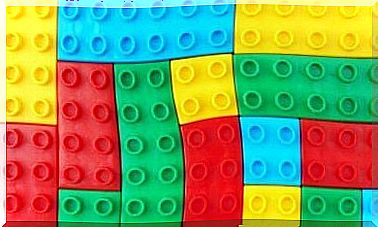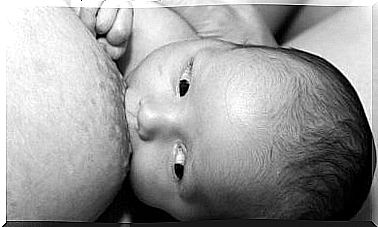3 Reasons Why You Shouldn’t Force Your Child To Eat

However, it is not always easy for your child to get used to the new flavors, which is why you should not force your child to eat.
Getting babies to eat new foods takes a lot of patience because we see it as a duty. We are somehow convinced that they should start eating solid foods. This is why some parents force their children to eat.
Mothers are sometimes interested in this topic because they want to stop breastfeeding. The problem with this, however, is that babies tend to be in no rush to try new foods. We all know how complicated it can be to get them to eat. This sometimes makes feeding time the most difficult event of the day.
Why you shouldn’t force your child to eat
All of the “little planes” and “chuchu trains” that we have to remove from the ground show how difficult it is to help children get used to complementary foods. While it is true that the child should include more nutrients in their diet, one should not force the child to eat .
If the pediatrician told you it was time for your child to eat grains and vegetables, that doesn’t mean it has to happen overnight. It is important for us that children eat their own way – anything else is an unnecessary burden.

Complementary foods are nothing more than a supplement. This does not mean that we should replace all of the food at once, but that we add new ingredients.
A common mistake made by parents is to feed their child the same food that adults eat. They believe that otherwise their child will not get all of the necessary nutrients, and that too is a mistake.
Here are some of the reasons why we shouldn’t force our child to eat:
The daily requirement depends on the age
Sometimes pediatricians recommend a specific daily requirement. However, this dimensioning can be incorrect for various reasons. One reason for this is that the food concentration can vary, for example one can make very dilute or more concentrated porridge.
Even if a child does not eat everything in the end, it is difficult to estimate how much the child still needs to eat. If you don’t take into account the breast milk you give your child, you can overfeed them. Every baby is different and has a different daily requirement.
According to studies, the approximate nutritional requirements are as follows:
- 6-month-old girls approx. 819 kcal, for boys a maximum of 779 kcal.
- A 9 month old girl needs a maximum of 859 kcal. Boys at this age need up to 924 kcal.
- 1-year-old girls need between 500-1000 kcal, while boys of the same age need 479-1169 kcal.
- Children aged 18 months need approx. 1200 kcal.
- Children aged 24 months need a maximum of 1300 kcal for boys and 1273 kcal for girls.
Complementary foods are a supplement

When we force our children to eat complementary foods as their main diet, we change the concentration of their food. This can be harmful to your health. So we shouldn’t force the child to eat.
It is true that babies need additional nutrients, but their nutritional needs are growing all the time. The child’s gender also plays an important role in how many calories are needed.
Sometimes we make the mistake of forcing children to eat more than necessary. For example, two children of the same age do not necessarily have to eat the same amount. We also make the mistake of comparing children to their brother or friend who eats more.
Breast milk should initially remain the staple food in your diet. Purees, porridge, etc. are a supplement. It doesn’t matter whether you want to eat or not. Children themselves know quite well how much to eat, so they shouldn’t be forced.
Solid food is not their thing
As appetizing as the recipe may seem, babies are not yet familiar with solid foods. They don’t know how to eat them either; they don’t know anything about spoons or cups. They only know their mother’s breasts. The learning process takes a long time and you shouldn’t rush it.
Allowing children to discover new foods that you prepare themselves is recommended. Before you eat, they should be comfortable and secure with what they see on their plate, whatever you’ve prepared. They should be able to examine the food with their hands and be given time to indulge in the new smells.
You can also let them experiment with whole foods instead of chopped up. You can give them fruit in the form of small sticks. You can also give them whole vegetables. It is important that they do not feel pressured while eating. If you don’t want to eat at the moment, that’s no problem.
Offering groceries to your baby can also be a way to get them to try new things. Ask them if they want a piece of fruit and want to touch it or try it. The taste develops over time and not from one day to the next.
There are foods that your child just doesn’t like. Nobody should be forced to eat something they don’t like. Try to put yourself in his shoes.









